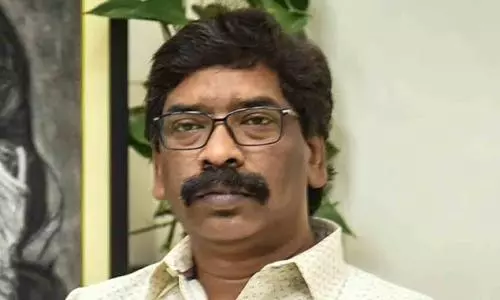
The fight for justice
text_fieldsWhen the Supreme Court's judgment came on the Ayodhya Babri Masjid case, which granted ownership of the property where the masjid stood for centuries, merely on the basis of belief to the Hindu parties and gave the Muslim parties – who had made a documented case for title to the property – a plot of 5 acres at another suitable location, the first impression across the country in the first few hours after the verdict was that the judgement was welcomed or accepted by and large regardless of religious-community groupings. The overall response was one of relief that a thorny issue had somehow come to an end which had given sleepless nights to the country for decades and caused constant conflicts and disturbances.
But as days pass by, an observation is getting further and further strengthened that the verdict of the five-judge bench of the apex court was not just or based on hard evidence. Although the UP Central Sunni Waqf Board is the main Muslim party, the party that represented Muslims at a national level is All Indian Muslim Personal Law Board (AIMPLB), which lent support to the conduct of the case in every manner. A crucial meeting of the Board has decided that since the court order is totally unjust, a review petition should be filed against it. Though the meeting of AIMPLB was scheduled to be held at the Nadwatul Ulama, the renowned Islamic institution in Lucknow, it had to be shifted to a different within Lucknow itself following a prohibition by Yogi Adityanath government.
What AIMPLB points out as its key disagreeement is the unfairness and injustice in allotting the masjid land to the same party that surreptitiously installed an idol within the masjid on the night of 22 December 1949 – a point accepted and emphasized by the court as an illegal act. Thus the perpetrators of the guilt get a right to possess the very property. Secondly, there is the injustice cited by the Board that the same bench, which notes that the demolition of the Babri Masjid on 6 December 1992 was a totally illegal act, granted ownership of the masjid land to the very attackers of the property. In fact, the court had, at the very outset of the case, made it clear that a land dispute could not be resolved merely on the basis of faith; but with the verdict the land was transferred to those who believed that the plot was the birthplace of Ram, whose rationale is also being questioned.
These are observations and opinions not of AIMPLB alone, nor of Muslim bodies like Jamiatul-Ulama-e-Hindu, Indian Union Muslim League, Majlis-e-Ittehadul Muslimeen. Former Supreme Court judge and reputed jurist, Justice PB Sawant opined that the court's judgment was though politically correct, legally wrong. Former BJP leader and union minister Yashwant Sinha commented, "the Supreme Court judgment is a faulty judgment, it is full of flaws, but I will still ask the Muslim community to accept the judgment and put the whole thing behind us." Former Supreme Court judge and Chairman of Press Council of India, Justice Markandey Katju used stronger words to criticise the judgment.
More reactions of disapproval of the verdict have been coming from social and political leaders. The CPM Polit Bureau that met in Delhi the other day pointed out that the judgment did not bring full justice, and faith found precedence over facts in it. The Polit Bureau also draws attention to another deficiency: even as the court reiterates the provisions of the Places of Worship Act 1991 that the status quo ante of 15 August 1947 in relation to places of worship should not be disturbed, it was still short of eliminating the possibility of claims arising in future about Kashi and Mathura, a patently unjust factor. When these points are considered, the caution and insistence by some quarters that Muslims now should keep mum and accept the court verdict as such, is not at all justified.
Review petition is a corrective measure provided for in law. But who can file it, whether the court will accept it, even if it is accepted for filing and if it comes before the same bench whether it will be subjected to correction or amendment are questions that cannot be ignored. Answers to these are to come in the coming days. But the aggrieved party has to ensure and convince the coming generation that it has sought the ultimate resort prescribed in the constitution and law, and that even if injustice is not remedied, they have fought for justice to their last. When a cloud is gathering in the country whereby constitutional obligations and rule of law are treated with disdain, those who uphold both are not to fall into despondency, withdrawal or submission. Nor is violence or use of force their path. Their only way forward is to muster all strength joining hands with lilke-minded forces and persevere in the struggle for justice.











